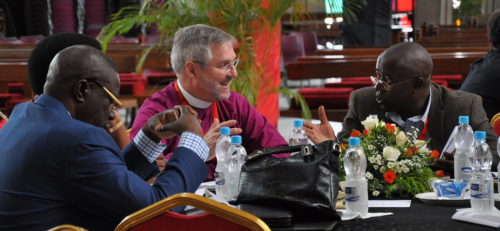Connecticut bishop will not stand for Anglican Consultative Council chairPosted Apr 12, 2016 |
|

Connecticut Bishop Ian Douglas, Episcopal Church bishop member of the Anglican Consultative Council, to a tablemate during a recent session of the ACC-16 meeting in Lusaka, Zambia. Photo: Mary Frances Schjonberg/Episcopal News Service
[Episcopal News Service – Lusaka, Zambia] Diocese of Connecticut Bishop Ian Douglas, one of the Episcopal Church’s three Anglican Consultative Council members, said April 12 that he would not stand for election as its chair.
Douglas, who had been widely expected to seek the office, sent a letter about his decision to the members of the ACC Standing Committee who were at that group’s April 6-7 meeting.
“While I pray that I can continue to be of service to the Anglican Communion in some new way in the future, I believe that my not pursuing election as chair of the ACC at this time will best facilitate our walking together in unity as the Anglican Communion, and that is my highest priority and my greatest hope and prayer,” Douglas said in his letter.
Douglas is ending his term on both the ACC and Standing Committee at the close of the ACC-16 meeting. The ACC elected Douglas in 2009 to be one of its representatives on the Standing Committee.
In his letter, Douglas, noting the end of his term, said he pledged his “ongoing support and prayers” for the Standing Committee members new and old, and for the secretary general of the Anglican Communion. “God bless the Anglican Communion in our diversity and common service to God’s mission in Jesus through the power of the Holy Spirit,” he wrote.
A majority of the leaders of the communion’s 38 provinces – known as primates – during their January gathering called for three years of “consequences” for the Episcopal Church in response to the 78th General Convention’s decision to change canonical language that defines marriage as being between a man and a woman (Resolution A036) and authorize two new marriage rites with language allowing them to be used by same-sex or opposite-sex couples (Resolution A054).
The primates said that they were “requiring” that for those three years the Episcopal Church not serve on ecumenical and interfaith bodies, not be appointed or elected to an internal standing committee, and “that while participating in the internal bodies of the Anglican Communion, they will not take part in decision-making on any issues pertaining to doctrine or polity.”
Douglas said in an interview April 12 that his decision not to run was “not in response to the primates’ communique per se.”
“Rather, my discernment has been directly informed by the relationships I enjoy here in the ACC and my commitment to fostering the unity of the Anglican Communion.”
At the close of its April 6-7 meeting, the Standing Committee of the ACC issued a report affirming “the relational links between the Instruments of Communion in which each Instrument, including the Anglican Consultative Council, forms its own views and has its own responsibilities.”
In a statement issued April 11, Bishop Josiah Idowu-Fearon, secretary general of the Anglican Communion, acknowledged that no ACC member can be prevented from nomination to the Standing Committee. “However during their first day in session,” wrote Idowu-Fearon, “Archbishop Justin presented a report to the ACC of the Primates Meeting. As promised he requested the ACC to work with the primates for the welfare of the whole Communion.”
Nominations for ACC chair close midday on April 13 and the election is set for April 15. The nominations for vice chair and Standing Committee members close on April 16 with the elections coming April 18.
Douglas, who was a General Convention four-time deputy before he was elected bishop of Connecticut in 2009, served on the design group for the 2008 Lambeth Conference of Anglican bishops and has been a member of the Inter-Anglican Standing Commission on Mission and Evangelism and a consultant for Theological Education in the Anglican Communion. Former Archbishop of Canterbury Rowan Williams awarded Douglas the Cross of St. Augustine, the highest honor in the Anglican Communion, for his work on the Lambeth Conference. More information about Douglas is here.
Before the next meeting of the Anglican Consultative Council, expected in 2019, the Episcopal Church’s Executive Council will elect the church’s bishop member of the ACC. The Rev. Gay Clark Jennings, president of the House of Deputies, is the clergy member and Deputy Rosalie Ballentine of the Diocese of the Virgin Islands is the lay member. Jennings is attending her second meeting and Ballentine her first. ACC members serve for three meetings.
Read more about the Anglican Consultative Council
The ACC is one of three Instruments of Communion, the others being the Lambeth Conference of Anglican bishops and the Primates Meeting. The archbishop of Canterbury (who is president of the ACC) is seen as is the “Focus for Unity” for the three instruments.
Formed in 1969, the ACC includes clergy and lay people, as well as bishops, among its delegates. The membership includes from one to three persons from each of the Anglican Communion’s 38 provinces, depending on the numerical size of each province. Where there are three members, there is a bishop, a priest and a lay person. Where fewer members are appointed, preference is given to lay membership.
The council meets every three years or four years and the Lusaka meeting is the council’s 16th session. The first meeting was held in Limuru, Kenya, in 1971. The ACC last met in late 2012 in Auckland, New Zealand. The ACC has not gathered in Africa since its ninth meeting in Cape Town, South Africa, in 1993.
Ongoing ENS coverage of the ACC is here.
The House of Deputies News page is also posting stories about the meeting.
Tweeting is happening with #ACCLusaka.
– The Rev. Mary Frances Schjonberg is an editor/reporter for the Episcopal News Service.

Social Menu